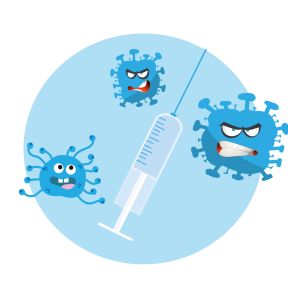KEY POINTS-
- A new meta-analysis reveals that psychological inoculation is effective against the spread of misinformation.
- Inoculation can help people discern better between credible and manipulative information.
- There is a first-mover advantage to dealing with manipulation.
- Prebunk rather than debunk misinformation when you can.
The spread of harmful misinformation has led people to vandalize 5G phone masts, ingest toxic products, endorse political violence, refuse life-saving treatment, and in some cases, encourage deadly mob lynchings. The recent arrest of former President Donald Trump reiterated how the spread of conspiracy theories can undermine democratic elections.

Falsehood Flies
One of the main ways in which misinformation is addressed is through fact-checking and debunking. Although debunking falsehoods can sometimes be effective, a recent overview of the literature found that debunking misinformation about science, had about a zero effect on people. Moreover, borrowing models from epidemiology, research finds that misinformation can often spread like a virus online, outpacing the spread of credible information. In the words of Jonathan Swift: "Falsehood flies, and the truth comes limping after it; so that when men come to be undeceived, it is too late; the jest is over, and the tale has had its effect."
As Lee McIntyre shrewdly observes in his book On Disinformation, it is naive to think that "good" information will "crowd out" bad information.
The obvious question then is whether we can devise a vaccine against misinformation. Together with my colleagues, we have investigated this question for many years (which I summarized in Foolproof: Why Misinformation Infects Our Minds and How to Build Immunity).
Psychological Inoculation
Inoculation theory or prebunking is a preemptive approach to fighting misinformation that follows the medical analogy closely: by exposing people to severely weakened doses of misinformation or the techniques used to produce misinformation, and by refuting it in advance, people can build up cognitive resistance to (similar) misinformation in the future. Just as the body needs a lot of examples of invading pathogens to mount an effective immune response, it works the same way with the brain—we need to deconstruct a lot of micro-doses of manipulation for people so they can generate an effective mental immune response.
Just to be clear: Inoculation isn't about telling people what to believe, it's about neutralizing a manipulator's attempt to deceive you by deconstructing their tricks in advance (for a good resource on manipulators, see Dale Hartley's book "Gulling the Rubes").
To illustrate, in one study, we preemptively exposed people to a small dose of the "false dichotomy" technique, which falsely presents people with only two options while in reality there are more (it aims to take away all nuance and promote extremism). We administered a small dose of Star Wars (Revenge of the Sith) where Anakin Skywalker confronts Obi-Wan Kenobi and says, "Either you are with me or you are my enemy." Politicians and extremists love to use this tactic: "Either you support AR-15 rifles or you're against the 2nd Amendment." "Either you join ISIS or you're not a good Muslim." We found that people exposed to a weakened dose of the tactic became better at recognizing such manipulative tactics on social media.
New Meta-Analysis
However, to date, there has been no quantitative summary of the effectiveness of this approach in the context of misinformation. Does psychological inoculation work across different issues, topics, and studies? A new meta-analysis was just published examining results from 42 experiments involving more than 40,000 people.
The conclusion: Overall, psychological inoculation was effective in helping people spot misinformation, and it also helped people discern better between credible and manipulative content. One particular strength of this meta-analysis is that they solely focus on the most rigorous types of studies: Randomized controlled trials. However, since I work in this field, I could be biased. I conducted quite a number of the experiments so they included my team as a moderator in the analysis. "Van der Linden’s team introduced psychological inoculation to misinformation—and has conducted many related studies with his collaborators." They wanted to make sure that these findings were not skewed by the contributions from a single laboratory.
Importantly they concluded the following: "Van der Linden’s team did not differ significantly from other researchers, implying that different research teams arrived at similar results, increasing the reliability and generalizability of the results."
This doesn't mean that meta-analyses are free from all bias. Researchers conduct systematic searches to cover an entire field of study, but it's always possible they missed some studies. (In fact, we tend to adjust estimates downward to account for publication bias.) And there will always be more studies in the future. But at least, to date, this is the first summary of an emerging field of research in the area of "mental immunity" and it is reassuring to know we are not helpless in the fight against misinformation: let's inoculate each other against the techniques of misinformation so that falsehoods no longer have a chance to spread and infect our minds, regardless of one's ideology.


